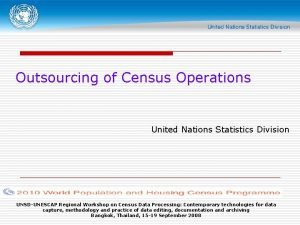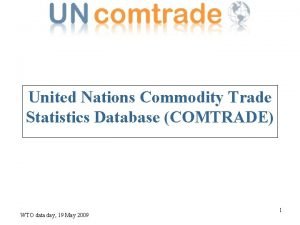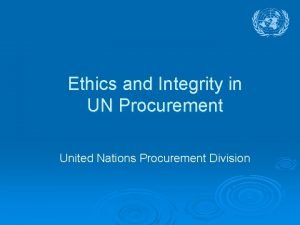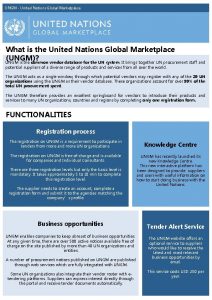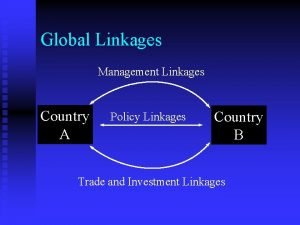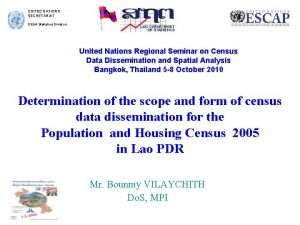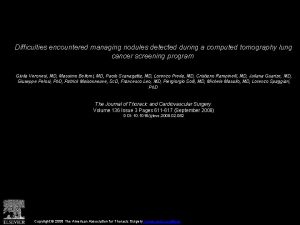Product linkages and difficulties encountered United Nations Statistics
















- Slides: 16

Product linkages and difficulties encountered United Nations Statistics Division EGM, May 2015

Background o The Harmonized System (HS) is considered a “reference classification” for the classification of goods and the CPC uses the HS to provide building blocks for the definition of its categories (subclasses) in sections 0 -4. o A few exceptions have been made where the HS detail was perceived to be insufficient n E. g. Products that locally consumed, therefore not entering international trade

Background o In general, interpretations/rulings in the HS have an impact on the classification of corresponding items in the CPC, since we often use the HS as a definition for the scope of CPC subclasses. n The project of developing independent explanatory notes may alleviate that problem, but this is a long term project and has its own shortcomings

Linkages o Since the classification of an item in CPC will often be used to identify its manufacturing class in ISIC, HS interpretations may also impact interpretations in ISIC n This is even stronger in the European context (CN, CPA, NACE) o While there is no strict rule for that, it is a method often used in practice n Appears easier to use, which is important in many countries

Linkages o Some rulings in HS create problems when we follow the strict/strong links that seem implied by our classifications o Some also point to areas that may not be clear enough in CPC/ISIC o The question for us is: How do we avoid such problems? Note: HS rulings are not always easy to identify, but many national rulings exist

Examples (1) Example from www. gov. uk o Products whose classification may not be obvious o CD and DVD drives o DVD burner - external unit, designed to record video onto a DVD disc from video camera recorder via USB connection

Examples (1) o CD and DVD drives – UK 8471 70 30 90 n HS 8471. 70 n CPC 45272 (media storage units) n ISIC 2620 (computers and peripherals) o DVD burner - UK 8521 90 00 90 n HS 8521. 90 n CPC 47323 (video recording or reproducing apparatus) n ISIC 2640 (consumer electronics)

Examples (1) o CD and DVD drives n ISIC 2620 (Computers and peripheral equipment) o DVD burners n ISIC 2640 (Consumer electronics) o Note: CD and DVD players are in ISIC 2640! o Issue: Connectivity to an ADP

Examples (2) Example from www. gov. uk o Products whose classification may contradict ISIC o Classifying e-book readers o A portable battery operated apparatus for recording and reproducing various types of text, images and audio files. These units can incorporate an internal memory, card reader, USB interface, with or without a translation or dictionary function. o They’re classified under subheading code 8543 70 90 99.

Examples (2) o Other portable computers o Portable computers that don’t meet the above requirements can include touch screen, luggable and industrial computers. There’s no maximum weight, but they must include at least the following within the same housing: • a CPU • an input unit • an output unit o A touch screen usually counts as both an input and an output unit. o These types of portable computer are classified under subheading code 8471 41 00 90.

Examples (2) o Other portable computers n HS 8471. 41 n CPC 45230 n ISIC 2620 (Computers and peripheral equipment) o e-book readers o o HS 8543. 70 CPC 46939 ISIC 2790 (Other electrical equipment) For us: ISIC 2620 (Manuf. of computers)

Example (2 a) o E-book n Also discussed by the EU Customs Code Committee o 4. 1 E-book (TAXUD/31147/2010) n Options considered: HS 8471, 8517, 8519, 8528, 8531, 8543 and 9504 o Possibly resolved later and reflected in the UK decision above


Example (3) o We maintain links at the most detailed level n Discrepancies avoided as much as possible o Higher level concepts do not always match n E. g. “Pharmaceuticals” exist in HS, CPC, ISIC n Boundaries do not match at all n ? ? How important is that ? ?

Way forward o How can we avoid differences in interpretation among the different classifications? n Is there a viable process? o To what degree can we accept contradictions? n We often use those linkages (e. g. ecigarettes) o Countries need guidance that can be implemented without major problems n Product-industry linkages are important

Way forward o To clarify: n We are not looking for an HS-ISIC correspondence o We have that already n We are not trying to have an ISIC structure that follows HS o We know that doesn’t work n What we need is easy practical guidance on how to apply the product-industry link and how to avoid misclassifications
 United nations statistics division
United nations statistics division United nations statistics division
United nations statistics division Un commodity trade statistics database
Un commodity trade statistics database Finely divided, bulk effervescent
Finely divided, bulk effervescent Un dss
Un dss Ethics and integrity at the united nations
Ethics and integrity at the united nations United nations
United nations Unmg
Unmg Six main organs of the united nations
Six main organs of the united nations What is the role of the united nations?
What is the role of the united nations? Introduction to model united nations
Introduction to model united nations Challenges in monitoring and evaluation
Challenges in monitoring and evaluation United nations zambia
United nations zambia United nations
United nations United nations
United nations What is mun
What is mun The agency sponsored by the united nations that compiles
The agency sponsored by the united nations that compiles

